Hay makes up a sizable portion of a guinea pig’s diet, yet it isn’t particularly nutrient-dense. Vitamins must be provided in the form of fresh fruits and vegetables because guinea pigs cannot make them within their bodies.
Most fruit contains a lot of sugar, which has little nutritional value and can cause health issues – and so is best consumed occasionally and in small quantities. However, many fruits are incredibly nutrient-dense and are an excellent complement to the daily diet of your cuddly potato.
Numerous fruit varieties also include considerable amounts of vitamin C, which is crucial for piggies because they can only obtain this vitamin from food. They can’t make vitamin C like other animals can.
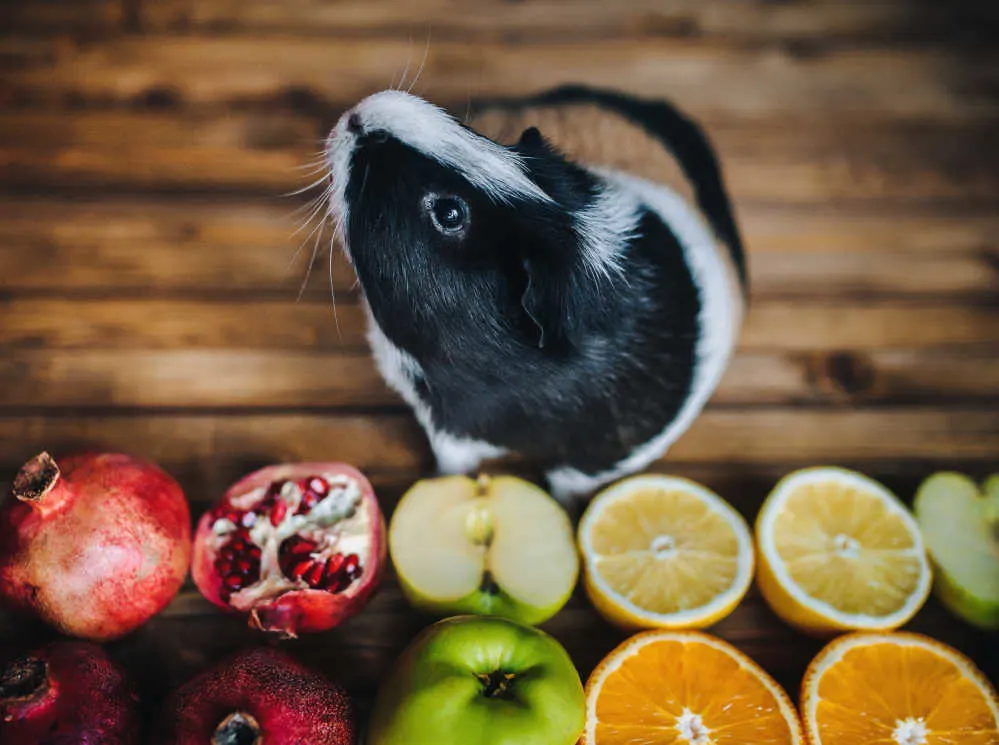
What fruits should you avoid, and which can guinea pigs consume frequently, though? In this post, you’ll learn about the types of fruits that guinea pigs can eat and the right foods for your beloved pet. You’ll also get advice on how often to feed your guinea pig and choose a variety of nutritious fruits.
So without further ado, here is a list of the best safe fruits guinea pigs can eat before you run around asking, “Can guinea pigs eat apples?”
What types of fruits can guinea pigs eat?
The sugar content of fruit is primarily what attracts guinea pigs to it. Fresh fruit can be a pleasant treat for your pet in the proper amounts, as well as bringing them health benefits. Along with a healthy diet of fresh, high-quality hay, leafy greens, and guinea pig pellets, the following fruits are suitable for guinea pigs to consume in modest amounts.
Kiwi
Because of kiwi’s high vitamin C content, even small servings can provide a significant vitamin boost. Due to its high sugar content, it should be added to your guinea pig’s diet in moderation, just like any other fruit.
Additionally, it has a healthy quantity of fiber to aid their digestive systems and potassium to avoid bladder stones. Before dicing and serving it to them, remember to remove the skin.
Bananas
Bananas are particularly healthy for your guinea pigs since they are high in fiber, vitamin A, vitamin B6, and vitamin C. Your guinea pig’s fur is maintained by vitamin B6, keeping it silky and supple. If they don’t have this vitamin, they could get skin rashes.
In moderation, you’re fine to give bananas to your guinea pig. Bananas are rich in potassium and vitamin C, which assist the body in controlling fluid balance. Enough vitamin C in the diet can also help guinea pigs’ skin and joints, as well as aid in the speedy healing of wounds, so vitamin C supplements are often recommended to prevent vitamin C deficiency
But because bananas contain so much sugar, give your cavy no more than a few bits once a week.
Blueberries
Blueberries are a fantastic food for guinea pigs given their high vitamin and antioxidant content. They provide piggies with essential antioxidants, manganese, vitamin K, and vitamin C.
They contain little calcium and are a favorite snack of many guinea pigs.
However, blueberries also have a lot of sugar and are acidic, so feed sporadically in limited quantities.
Because some guinea pigs are more prone to developing mouth sores, blueberries might not be suited for all guinea pigs. Feed them little portions to test the food, then gradually increase the consumption.
Watermelon
Many guinea pigs adore watermelon. Besides the sugar content, feeding it poses no significant risks because it is not exceptionally high in calcium. It also doesn’t have a lot of vitamin C, but it has a lot of potassium, which helps the body’s fluid balance.
Guinea pigs can eat watermelon, but it shouldn’t make up a large portion of their diet. Once a week, you can give your guinea pigs a tiny bit.
Watermelon peel and flesh are both edible to guinea pigs. The rind and white portion of the flesh are preferable for chunky piggies because they contain less sugar. Before giving your guinea pig a slice, rinse it properly and remove any seeds.
Cantaloupe
Piggies love cantaloupe very much. Due to its high vitamin C content, consider including this fruit in your animal friend’s diet. Always remember to serve small portions and to keep them fresh.
You can feed a tiny cube or slice of cantaloupe flesh each week. Make sure to remove the rind and seeds because they are difficult for guinea pigs to chew and digest, and the seeds might cause choking.
Apples
Apples are undoubtedly a healthy fruit for humans, but they are also beneficial for guinea pigs. They are rich in nutrients, and many guinea pigs also enjoy apples.
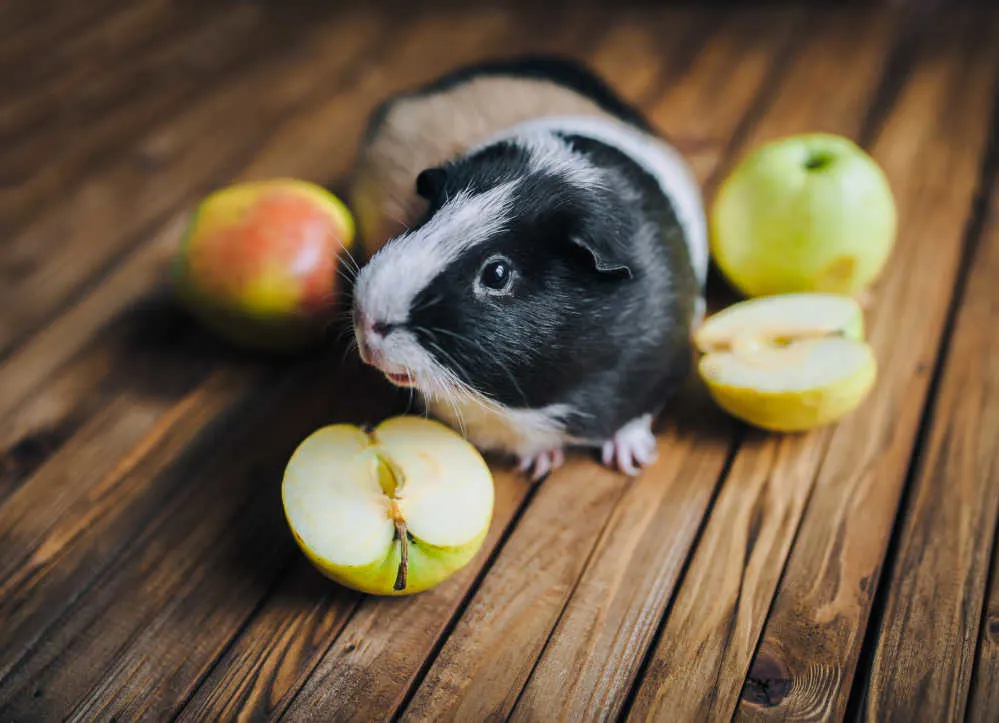
The fiber in apple peel is beneficial for your guinea pig’s digestion. Calcium, a vital mineral for guinea pigs, is also present in apple leaves. If you have an apple tree in your yard, try putting an entire branch into their cage after washing it. Apple tree leaves are actually more nutritious to a guinea pig than fruit. Along with that, the wood will help keep their teeth clean as they eat the leaves.
Strawberries
You should occasionally give your guinea pig strawberries as a treat.
Numerous minerals, such as vitamin C, can be found in these delicious red berries. Feeding no more than one strawberry once a week is preferable because they contain lots of sugar.
The strawberry tops are equally edible to guinea pigs, and frequently they even prefer them. Piggies can even eat the plant’s leaves if you grow strawberry plants.
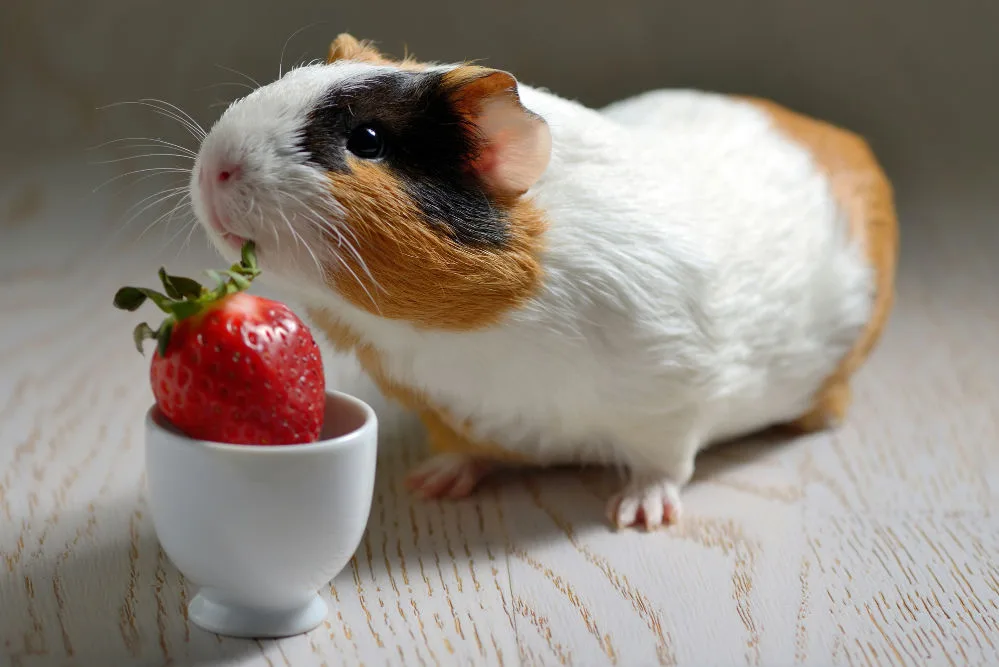
Cranberries
Cranberries offer many notable health advantages and can be fed to guinea pigs without causing any harm. They are rich in fiber, manganese, and vitamin C.
Proanthocyanidins (PACs), an antioxidant found in high concentrations in cranberries, prevent bacteria from lingering and expanding in the bladder. Cranberries can therefore be helpful for guinea pigs suffering from UTIs or other bladder issues.
If your guinea pig likes the taste of cranberries, it’s recommended to feed them in small amounts once or twice a week.
Bell peppers
Although they are frequently referred to as vegetables, sweet bell peppers are considered fruits.
Whatever category they fall under, red, green, and yellow bell peppers are among the healthiest foods you can give your guinea pig.
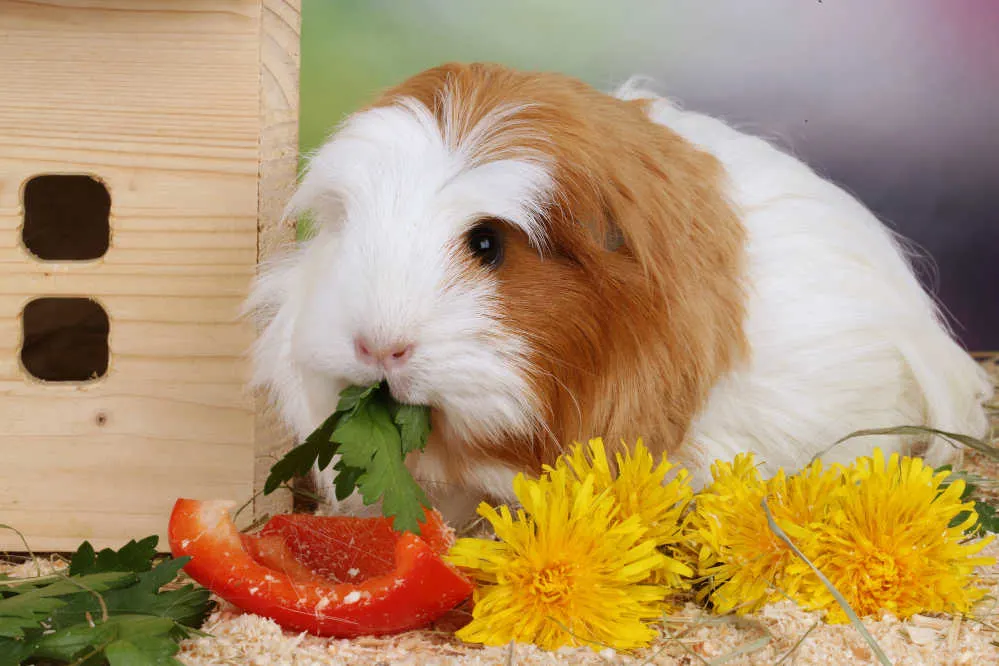
Giving them these daily is okay because they contain significantly less sugar than most fruits. Bell peppers are an excellent option for piggies because they are a great source of vitamin C.
Typically, one large slice of bell pepper will provide your guinea pig’s daily vitamin C needs.
Zucchini
Another fruit that frequently passes for a vegetable is the zucchini.
Zucchini has a fair amount of vitamin C and a lot of fiber. It is a great staple food to feed your guinea pig regularly because it is also low in sugar.
Guinea pigs can consume zucchini with or without the skin. Given that many advantageous antioxidants are concentrated in the skin, feeding them with the peel still on is ideal. Your guinea pig can consume up to two slices of zucchini per day.
Oranges
Oranges are delicious citrus fruits that both humans and guinea pigs enjoy.
Oranges are an excellent source of vitamin C, but because of their acidity, sugar, and calcium content, they should only be used in moderation. You can safely provide a piece of this fruit about once per week.
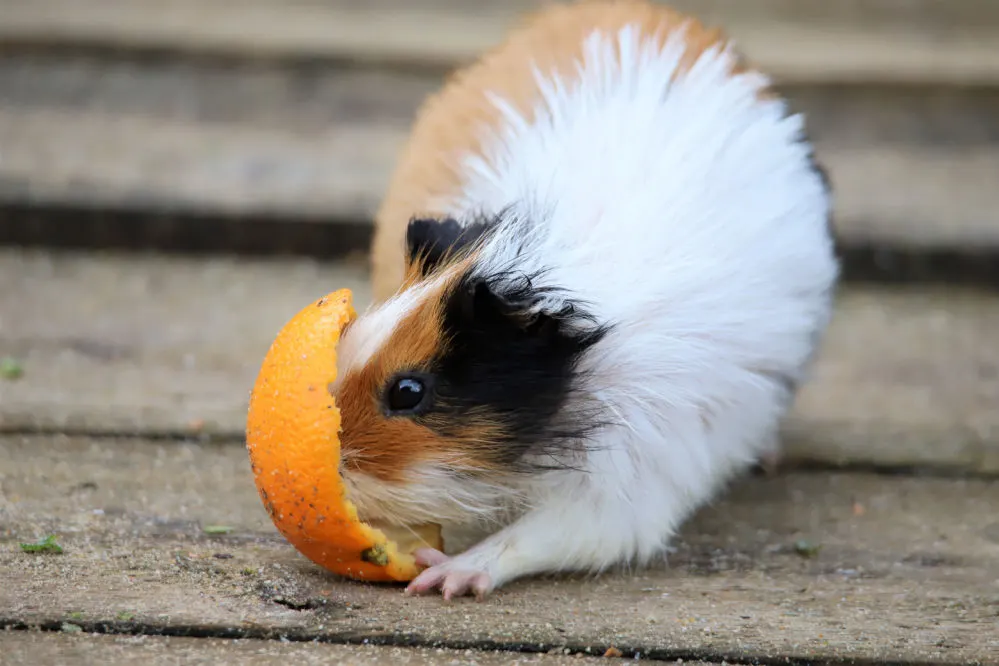
The vitamin C content of orange peels is considerably higher than the oranges, making them suitable for feeding. However, check if the oranges are organic, as pesticides are frequently present in the peels.
Scurvy in guinea pigs
Guinea pigs are susceptible to acquiring scurvy since their bodies cannot produce their own vitamin C. Your guinea pig has to consume 0.006 – 0.01 teaspoons (30 – 50 mg) of vitamin C daily to prevent this disease.
By selecting a pellet diet supplemented with vitamin C and limiting the specific fruits you feed your guinea pig, you may ensure that it receives the necessary doses of the vitamin.
Fruit is nonetheless frequently too heavy in sugar for guinea pigs despite its benefits. Several choices still give your guinea pig the essential vitamin C while being lower in sugar.
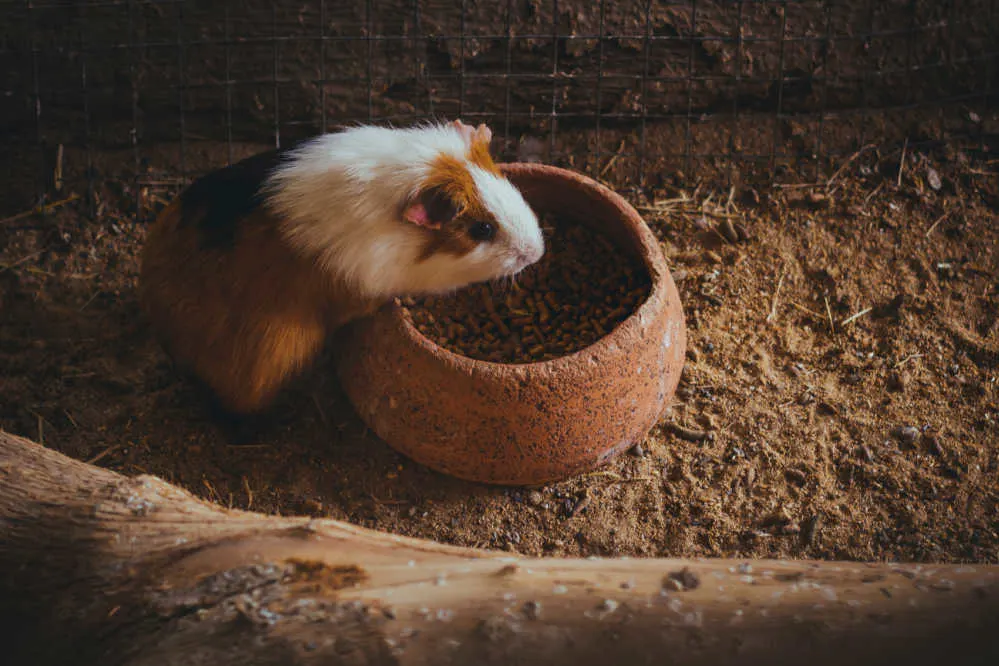
Vitamin C-fortified pellets and snacks can offer some of this essential ingredient, but guinea pigs require more vitamin C than that. Instead of putting it in their food or water, you can give your guinea pig extra Vitamin C in liquid or tablet form, ensuring they get what they need.
Take your guinea pig to the veterinarian immediately if you ever detect anything unusual with them. Sneezing, crusty eyes, weight loss, decreased appetite, decreased stool production, fatigue, hair loss, diarrhea, and reduced stool frequency are all indications of a potential disease.
What else should you feed your guinea pig?
You will need to supplement your guinea pig’s diet with other delectable foods since fruit should only be given to them as a dessert.
Hay is the most crucial component of your guinea pig’s diet. Guinea pig hay is a good choice for them as it has a lot of fiber, helps to wear down their teeth, and keeps them satisfied. Your guinea pig may become overfed on pellets or vegetables if it doesn’t have consistent access to hay. A good option for your piggy is Timothy Hay or alfalfa hay (which comes from the alfalfa plant and is packed full of essential nutrients).
Give your guinea pig continual access to a water bottle in addition to hay. Adding vitamin C supplements to the water isn’t recommended as it can affect the taste, causing your guinea pig to stop drinking from the bottle. This not only decreases the amount of vitamin C they get, it can also lead to dehydration. Instead, provide your guinea pig with an array of fresh vegetables and the occasional fruit. If your veterinarian still recommends a vitamin C supplement, give it directly to them.
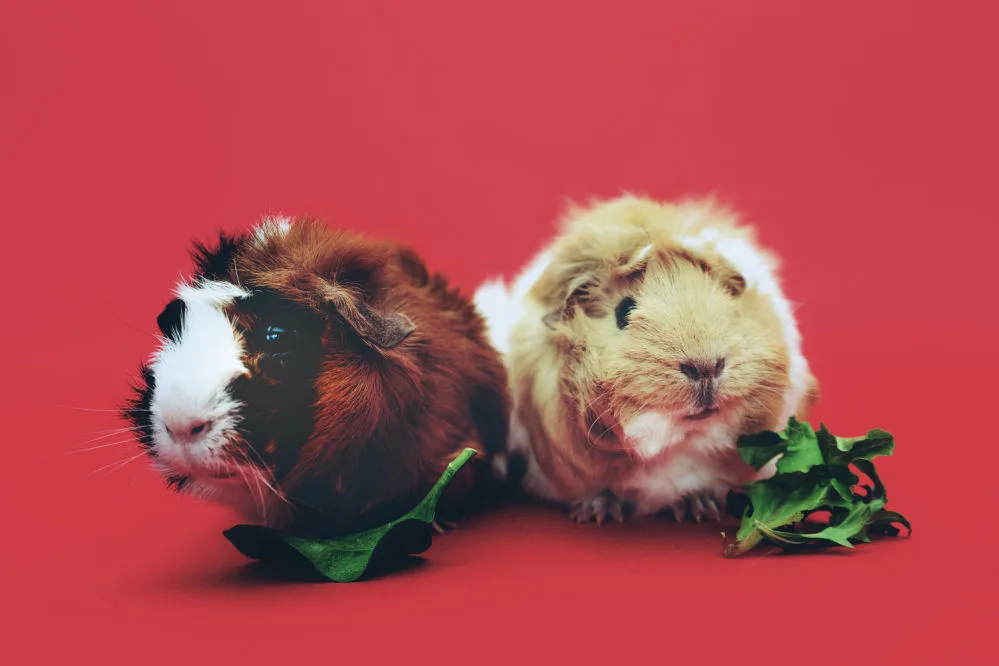
Feed your guinea pig fresh vegetables twice daily. The best greens are fresh since they are high in vitamins but low in calories. One cup of vegetables should be your daily goal. Iceberg lettuce shouldn’t be consumed since it contains too much water and can cause diarrhea.
Food pellets are also popular with some guinea pig parents. The proper amount of vitamins and minerals is provided by the pellets, but you shouldn’t give your guinea pigs constant access to them because otherwise they can become obese.
Final thoughts on guinea pig feeding
Should guinea pigs have access to fruit? Yes! Your guinea pig will benefit most from a fruit they enjoy and consume sparingly. The best diet for a guinea pig is one rich in new and fresh foods by sparingly giving it fruit and a variety of vegetables, as well as pellets that you can purchase from your local pet store.
Fruits are a wonderful treat for guinea pigs, and many have excellent nutrients that are good for their diet. A healthy diet means healthy bowel habits, so perhaps it’s a good idea to learn about how often a guinea pig poops?
Steph Dyson is a travel journalist by trade but a lover of all small pets. She’s been a pet mum to everything from gerbils to guinea pigs, rabbits to hamsters, and fish to dogs of all shapes and sizes. She wants to share her years of experience with small pets and make Small Pet Guides the go-to website for pet owners seeking information and care advice.

